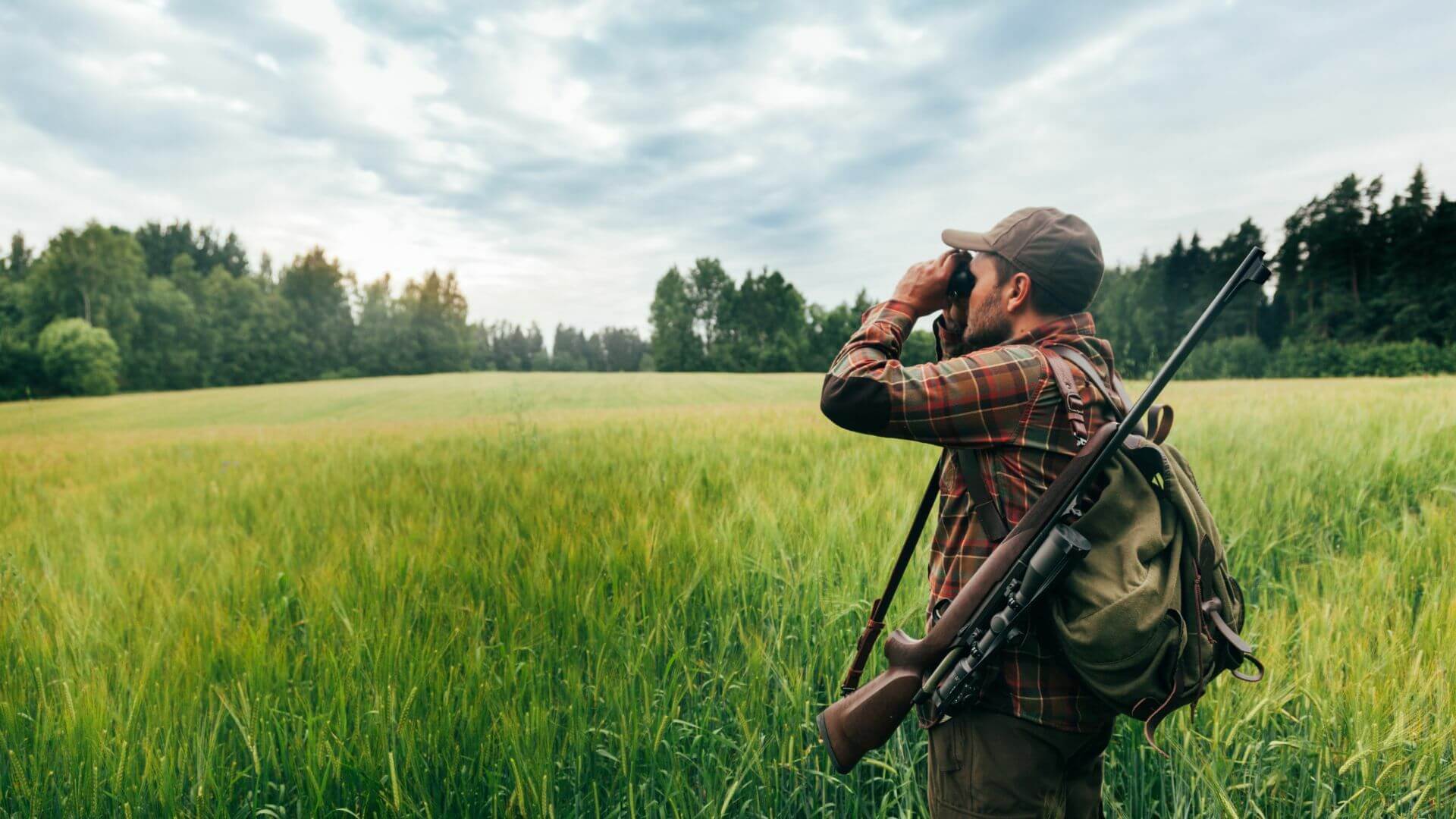 Would you like to purchase hunting property but don’t know where to begin? Well, you’ve come to the right place.
Would you like to purchase hunting property but don’t know where to begin? Well, you’ve come to the right place.
The dream of every hunter is to own their own slice of deer hunting heaven. It doesn’t matter how big or small it may be, owning a chunk of Michigan land you can hunt has a special meaning that we all want for our sportsmen’s passions to turn into reality. Unfortunately, not enough people take action on these dreams, and sadly they remain just that. This is because most people generally don’t know where to start.
In this blog post, we will outline the first steps that you need to take when buying Michigan hunting land for sale. So, whether you’re a seasoned hunter or a business owner looking to invest in hunting land, make sure to read on!
Step 1: Know Your Numbers…
 Knowing what you can spend comfortably is a prerequisite before you even start looking. The key word here is comfortably. Many consumers mistakenly believe that just because a bank approved them for a loan of $X amount, they can afford it. This could be the case if you don’t spend any money on products like food, coffee, clothes, and other necessities during the week, but you need to look closely at your monthly costs in order to fully comprehend what you can afford. Over the course of a month, discover where you can make cuts and save money.
Knowing what you can spend comfortably is a prerequisite before you even start looking. The key word here is comfortably. Many consumers mistakenly believe that just because a bank approved them for a loan of $X amount, they can afford it. This could be the case if you don’t spend any money on products like food, coffee, clothes, and other necessities during the week, but you need to look closely at your monthly costs in order to fully comprehend what you can afford. Over the course of a month, discover where you can make cuts and save money.
If you don’t have the money, you’ll need to start saving or find another way to pay. Many individuals turn to partners to enhance the amount of land they could buy. Partners bring in resources that may be very helpful, not just in terms of money, but also in terms of work and personally enjoying the property with people you enjoy spending time with on a regular basis.
Hunting is a pastime that is typically best enjoyed with others. Increasing your resources and, eventually, the amount of real estate you can afford may be accomplished by partnering with a TRUSTED partner.
You should start the process of locating a lender once you have determined how much you (and your partners) can comfortably afford.
Step 2: Finding a Lender
 You’ll avoid a lot of hassle later on if you get preapproved before drafting an offer on a property. The transaction will move a lot more smoothly, and you won’t have to go through the rush of receiving an accepted offer just to later face the anguish if you discover you can’t get the financing. It will also clarify what you can afford. If you don’t spend a lot of money on anything else after you get pre-approved and before you submit your offer, you should be fine. However, the preapproval procedure isn’t written in stone.
You’ll avoid a lot of hassle later on if you get preapproved before drafting an offer on a property. The transaction will move a lot more smoothly, and you won’t have to go through the rush of receiving an accepted offer just to later face the anguish if you discover you can’t get the financing. It will also clarify what you can afford. If you don’t spend a lot of money on anything else after you get pre-approved and before you submit your offer, you should be fine. However, the preapproval procedure isn’t written in stone.
Finding a lender for vacant and recreational property might be harder than finding one for a house, so you’ll want to start the pre-approval process as soon as possible. Why? For lenders, vacant and recreational land is significantly riskier.
You probably won’t be able to obtain financing from your neighborhood bank for a plot of undeveloped, recreational land. Finding a lender that specializes in financing for farmland and recreational properties will probably take some searching. Find out who your real estate agent would suggest by speaking with them.
Step 3: Finding the “right” Real Estate Agent
 It essentially costs you nothing to hire a reputable real estate agent to act as your buyer’s agent and can ultimately save you thousands of dollars. It’s best to select a real estate agent that has in-depth knowledge about hunting and hunting land when you’re looking for someone to represent you in Michigan hunting land transactions.
It essentially costs you nothing to hire a reputable real estate agent to act as your buyer’s agent and can ultimately save you thousands of dollars. It’s best to select a real estate agent that has in-depth knowledge about hunting and hunting land when you’re looking for someone to represent you in Michigan hunting land transactions.
Typically, you’ll wind up working with a different agent from the one from who you purchased your property simply because they are unlikely to be knowledgeable about the hunting land market.
A land expert from a firm like Michigan Whitetail Properties would be very helpful. They’ll assist in making the process go smoothly and can point out important considerations you probably didn’t think about in the first place.
Step 4: Start Looking For Your Michigan Hunting Property
When you have the first three things (budget, lender, and agent) in order, you can begin looking for your ideal home. You should prioritize the characteristics that are vital to you, much like when looking for a home. To assist us in our search for Michigan hunting land for sale, you should make a list of everything you want and prioritize it. Here’s an example:
- around 100 acres
- a 60-acre to 40-acre balance of agricultural and forested land
- Located in a “Good” area
- Huntability
- Access is easy to the entire property
- Potential food plot locations
- Good trees for treestands
In addition to those property attributes, we intended to acquire it for less than market value in order to increase our investment’s equity right away. Set your standards and adhere to them. Overpaying is the last thing you want to do.
Step 5: Research and Evaluate Your Options
 This is a two-stage procedure. The first phase, which takes place more on a county or regional level, should start while you are looking for a property. Once you’ve decided where you want to purchase your land, chat to local wildlife biologists and conservation wardens to learn about the area’s populations and other elements that might influence your choice of a Michigan hunting property to purchase. If you’re looking at land in a new region or many hours away from your house, this is extremely crucial. They will be considerably better at comprehending local elements than you are.
This is a two-stage procedure. The first phase, which takes place more on a county or regional level, should start while you are looking for a property. Once you’ve decided where you want to purchase your land, chat to local wildlife biologists and conservation wardens to learn about the area’s populations and other elements that might influence your choice of a Michigan hunting property to purchase. If you’re looking at land in a new region or many hours away from your house, this is extremely crucial. They will be considerably better at comprehending local elements than you are.
If you are really interested in a property and have identified a target county or region you’d want to buy land in, you should conduct more research and evaluation. This property should closely meet the requirements you listed before. If it doesn’t, you’re probably settling because you want to buy hunting land so badly that you’re willing to accept something less than ideal. Never settle; you will eventually regret it.
When you locate a property that interests you, the first thing you should do is open it on Google Earth to get a better sense of the layout and the surroundings. Understanding deer movement requires being able to examine the area from all angles, which Google Earth makes possible. It’s critical to consider the area as a whole and not just the listed home. Any particular deer typically has a home range of between 300 and 600 acres, or around one square mile.
One of the biggest mistakes landowners and potential purchasers make is to exclusively explore within the confines of their own properties. Find out how the majority of deer will be moving and follow those areas of cover. Search for any nearby agricultural areas that may be used as final feeding areas. When analyzing the deer hunting possibilities on your land, a few factors you should consider are travel routes, food sources, drainages, topography, and funnels. Consider unconventional approaches.
The property’s participation in any unique government programs, such as CRP Lands or Managed Forest Lands, that may influence your choice to acquire or carry out specific habitat improvements is another crucial factor to consider at this time.
Start analyzing the property you want to purchase once you feel comfortable with the way things are set up in the area. Return to your standards: Is access convenient? Good places to plant food plots? superior soil? good terrain? etc. Focus more on the factors you have less control over, such as location, topography, and accessibility; and other factors, such as clearing land for food plots or expanding the number of pathways, may be progressively improved by you.
Step 6: Boots on the Ground
 It’s time to go visit the property if you liked what you observed when scoping it out from a distance. Get out there and verify if this property is the one of your dreams because everything in your research points to it being such. Take the current owner or someone who may have previous hunting experience on the land for a walk if you can. Ask a ton of questions! How is the deer hunting? Are the neighbors easy to get along with? Any trespassing difficulties in the past? Has there ever been anyone poaching on the land? All of these are crucial inquiries that should be made. Not only will you learn very useful information, but you’ll also get to know the present owner/seller better.
It’s time to go visit the property if you liked what you observed when scoping it out from a distance. Get out there and verify if this property is the one of your dreams because everything in your research points to it being such. Take the current owner or someone who may have previous hunting experience on the land for a walk if you can. Ask a ton of questions! How is the deer hunting? Are the neighbors easy to get along with? Any trespassing difficulties in the past? Has there ever been anyone poaching on the land? All of these are crucial inquiries that should be made. Not only will you learn very useful information, but you’ll also get to know the present owner/seller better.
Your primary goal during your visit is to scout the property. Are there numerous deer signs? wholesome food, protection, and water for wildlife to thrive? What can be enhanced? How much will the upgrades set you back? etc.
You can analyze the property as you walk around by making a list of questions of this nature beforehand and crossing each item off as you go. Any queries you have throughout the journey should be written down as well. If you get all googly-eyed over the idea of owning such a property, it’s far too simple to forget questions that may have come up during the tour.
Step 7: Make an Offer
 This is a MAJOR step! It has mainly been all talk so far and no action. The talk is cheap, but the offer is not! If your requirements have been met, you like what you see, and you have the money, you shouldn’t have too many worries. Don’t let your excitement cloud reality though.
This is a MAJOR step! It has mainly been all talk so far and no action. The talk is cheap, but the offer is not! If your requirements have been met, you like what you see, and you have the money, you shouldn’t have too many worries. Don’t let your excitement cloud reality though.
This is a significant investment, and all too frequently purchasers fall in love with a hunting property and convince themselves that concerns may be small when they are substantial. Even if you need to submit a good offer while you still can, take your time to confirm that it is, in fact, a good deal. Give your feelings some time to calm down so you can think clearly. Don’t buy something on a whim. Ask a friend who isn’t emotionally involved what they think of it.
It’s time to sign and make your offer if you’ve made it this far and still like the property. Don’t be hesitant to make a fair offer, especially if the item has been sitting for some time. You’ll know the seller is willing to lower their price if they counter. It takes skill to negotiate; you must stick to your guns and call their bluff while also trying not to insult the seller or let someone else storm in unexpectedly with a more tempting offer.
Step 8: Enjoy Your Michigan Hunting Land!
Nothing beats receiving a call from your realtor stating that the offer has been accepted. You can finally start having fun once you get through closure!
Congratulations on getting that Michigan hunting property you’ve always wanted!
The Best At Finding The Right Michigan Property For You!
Michigan is a great place to own land, and with the right company, you can find the perfect property for sale that will fit your needs. Michigan Whitetail Properties has been in the business of selling land for hunting and recreation for years, and we know what it takes to make sure our clients are happy with their purchase. Contact us today to learn more about our properties or take a look at some of our featured listings. We know you won’t be disappointed!